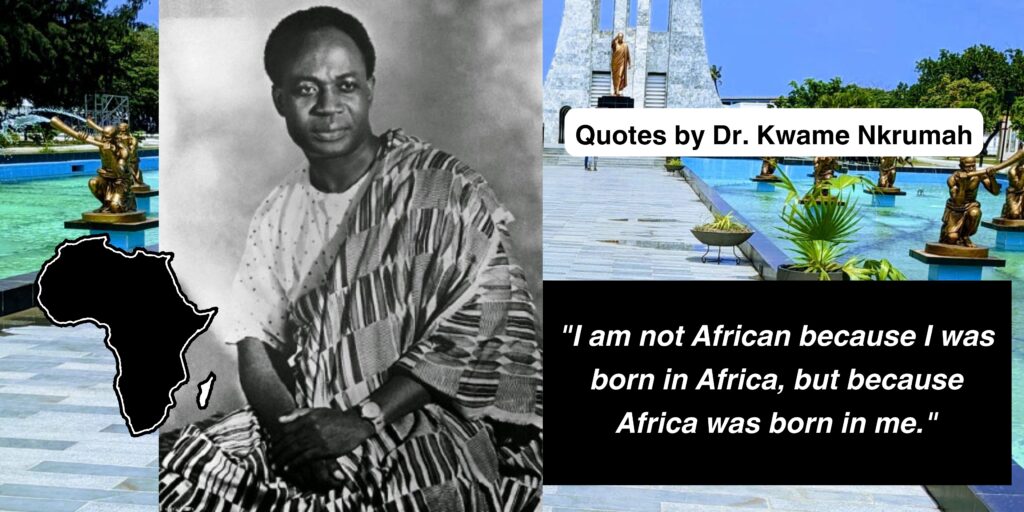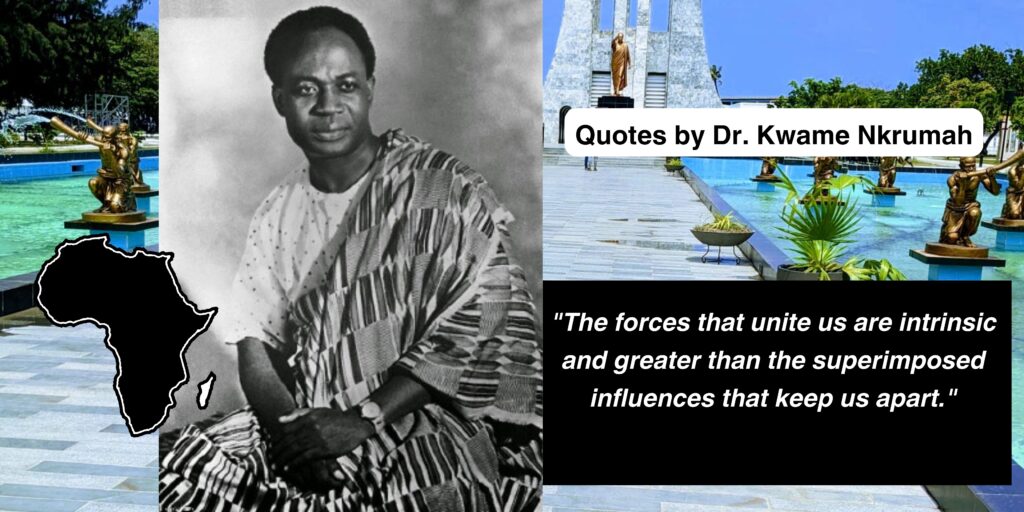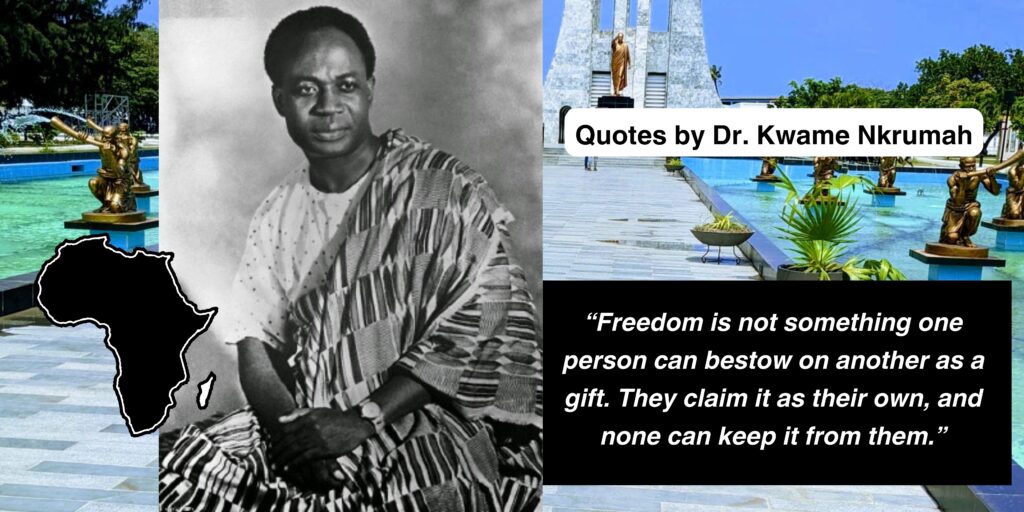Top 10 Quotes by Kwame Nkrumah
Dr. Kwame Nkrumah (1909-1972) was born in Nkroful, Gold Coast (now Ghana), West Africa. He was prominent in Ghana and Africa’s fight for independence. In 1957, Ghana became the first African colony to gain independence from British colonial rule, and Nkrumah became our first Prime Minister and later the President. He implemented various progressive policies, including infrastructure development, industrial development, economic growth, education reforms, health improvement, and promoting African culture.

Nkrumah’s vision extended beyond Ghana’s borders, as he actively supported independence movements across Africa. He was a charismatic and visionary leader, advocating for the liberation and unification of African nations. Nkrumah’s political ideology centred around the principles of Pan-Africanism and socialism, aiming to unite African countries and achieve socio-economic development for us. He co-founded the Organization of African Unity (OAU), now known as the African Union, and championed the cause of African unity.
Kwame Nkrumah’s legacy as a pan-Africanist leader continues to inspire generations. His ideas, principles, and projects continue to shape Ghana and the African political landscape, emphasizing the importance of unity, self-determination, and socio-economic development.
Famous Quotes by Kwame Nkrumah and Their Relevance
The following quotes are associated with Dr. Kwame Nkrumah1. I have expressed its implied meanings and relevance to guide our actions and inactions.
Quote 1
“I am not African because I was born in Africa, but because Africa was born in me.”
It suggests that being African is not solely determined by the place of one’s birth but rather by a deep connection and affinity to Africa. This implies that the essence of African identity transcends geographical boundaries and is shaped by cultural heritage, values, and experiences that resonate within an individual. The quote is particularly relevant to individuals of African descent who may have been born outside of Africa but still profoundly identify with their African roots. It acknowledges that African heritage can be carried and cherished by individuals geographically separated from the continent. Therefore, it encourages us to embrace and honour our African heritage, regardless of our geographic location or circumstances of birth.
Quote 2
“We face neither East nor West; we face forward.”
The quote teaches us that, as Africans, we must not favour one side of the world. Instead, we must prioritize our development and work collectively towards the continent’s progress. The quote underscores the importance of charting our path, focusing on our interests and development, and moving forward with a clear vision and determination.
It highlights the importance of unity and cooperation among African nations. By not favouring one ideological bloc, Nkrumah encourages African countries to unite, irrespective of their differences, and work towards shared development goals. It promotes a forward-looking mindset that goes beyond the divisions and influences of the past and seeks to build a future based on African agency and progress.
Quote 3
“People of Africa, we were created in the image of God, but men have made us think that we are chickens, and we still think we are; but we are eagles.”
This quote carries a powerful message about self-perception, reclaiming one’s identity, and challenging the oppressive narratives imposed on us Africans. It asserts that the true nature of Africans is far more majestic and powerful, symbolized by the metaphor of eagles. It implies that historical mistreatment and negative portrayals of Africa have led many of us Africans to internalize a diminished sense of self and to perceive ourselves as lesser beings. However, the quote calls for rejecting such perceptions and realizing that we Africans inherently deserve respect, dignity, and recognition. The quote suggests that, as Africans, we possess innate qualities beyond the perceived limitations or expectations. It, therefore, encourages us to challenge the negative stereotypes and narratives imposed on us and embrace our cultural heritage, talents, and contributions to society.
Quote 4
“We must unite now or perish.”
The quote suggests that the need for unity is pressing and immediate. It indicates that if Africa remains divided or fails to work together, we may be more vulnerable to external threats or internal conflicts that can ultimately result in our downfall. It serves as a warning of the potential consequences of disunity and encourages individuals and communities to put aside differences and unite for their shared future. Nkrumah recognizes that if African countries unite as one, we will become more powerful and capable of overcoming challenges. Collaboration and solidarity can lead to tremendous success and survival in adversity.
Quote 5
“People without the knowledge of their past history, origin, and culture are like a tree without roots.”
It suggests that understanding and embracing one’s heritage and cultural identity is vital for a strong foundation, pride, and sense of self-worth and belonging, much like a tree that needs roots to thrive. It implies that understanding the past allows us to connect with our forefathers’ struggles, achievements, and wisdom to carry forward their legacy. It highlights the importance of preserving and safeguarding our cultural heritage for future generations, so we don’t risk losing our traditions, values, and unique identity. It emphasizes the need to pass on cultural knowledge to maintain a strong and vibrant cultural legacy.

Quote 6
“The forces that unite us are intrinsic and greater than the superimposed influences that keep us apart
The quote highlights the significance of intrinsic factors that connect people, such as shared values, culture, and aspirations. These deeper connections have the potential to overcome superficial divisions and create a strong foundation for cooperation, understanding, and progress. It challenges the notion of separation based on factors like ethnicity, nationality, or social status. Instead, it promotes the idea that our shared humanity and common goals can unite us, transcending superficial differences. The quote aligns with Nkrumah’s pan-Africanist ideology, which aimed to unite African nations and foster a common purpose and identity. The quote’s message extends beyond the African context and has relevance to the broader human experience. It reminds us that despite external forces that may try to create divisions and conflicts, there are underlying bonds that can bridge gaps and foster unity on a global scale.
Quote 7
“The independence of Ghana is meaningless unless it is linked up with the total liberation of Africa.”
It emphasizes that Ghana’s independence’s true meaning and relevance lie in its connection to the larger goal of total liberation and empowerment of Africa as a whole. It promotes the idea that the progress and development of one African nation should be aligned with the progress and development of the entire continent. Therefore, it reflects the principles of Pan-Africanism, advocating for African unity and solidarity in pursuit of political, social, and economic liberation.
Quote 8
“Thought without practice is empty, and action without thought is blind.”
It suggests that ideas alone are only sufficient for creating real change if they are backed with action to bring those ideas to life and make a tangible impact. The quote emphasizes the importance of critical thinking and thoughtful analysis before taking action. It encourages us to consider the consequences and implications of our actions, ensuring that we are well-informed and intentional in our decision-making.
It implies that leaders must combine thoughtful reflection and strategic planning with decisive action by considering the consequences of their decisions, analyzing available options, and acting based on a well-informed understanding of the situation. It reminds activists and change-makers that passionate action should be grounded in thoughtful analysis and planning. It encourages individuals and communities to strategize and work towards their goals with a clear understanding of the issues at hand. Overall, the quote encourages us to avoid empty rhetoric or impulsive actions and instead pursue a balanced approach that combines well-considered ideas with practical implementation.
Quote 9
“We prefer self-government with danger to servitude in tranquillity.”
The quote underscores the value and the ability of Ghanaians and Africans to determine their own destinies. It suggests that the mere absence of conflict is not enough if it comes at the cost of surrendering one’s autonomy and submitting to servitude. It emphasizes the inherent human desire for freedom and the willingness to endure challenges to preserve that freedom. It encourages individuals and societies to be willing to face the dangers and uncertainties that may arise in the quest for autonomy.

Quote 10
“Freedom is not something one person can bestow on another as a gift. They claim it as their own, and none can keep it from them.”
The quote emphasizes that freedom is not a privilege or gift that others can bestow upon a person. It suggests that freedom is an inherent right individuals or communities claim for themselves. The quote highlights the concept of self-determination, wherein people have the power and agency to determine their destiny and claim their freedom. It challenges the notion that a dominant power can give or take away freedom, asserting that individuals or communities have the inherent right to claim and defend their freedom. It declares the intrinsic human desire for freedom and autonomy, emphasizing that no external entity can permanently withhold or control someone’s freedom if they are determined to claim it. It serves as a reminder that the quest for freedom is a fundamental human aspiration that cannot be extinguished or denied.
I trust that these quotes serve as inspiration for us to aspire to greater heights, carrying on the legacy of our ancestors and contributing to the greatness of Africa once more.
By: Huzeima Mahamadu
- Mahamadu, H. (2023). Journey Into Ghana: History, People, and Attractions (Vol. 1). Mahcap. ↩︎
